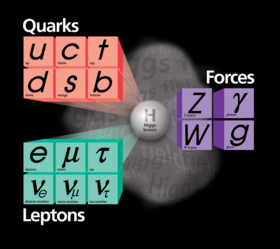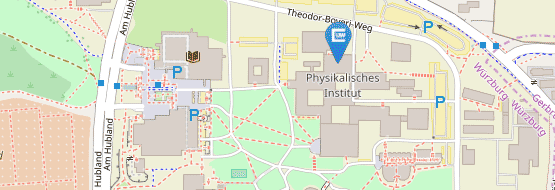Particle Physics
Particle physics studies the elementary constituents of matter and the forces acting between them. These are described by the Standard Model of Particle physics, which has been tested and confirmed to distances down to 10-19m, in particular by experiments at DESY in Hamburg, at CERN in Geneva and at Fermilab in Batavia (Illinois, USA). The precision of these experiments together with the high accuracy of theoretical calculations makes it possible to decipher the innermost quantum structure of matter. Despite all previous successes, some fundamental questions are still unanswered:
- Which mechanism generates the masses of elementary particles? Are these masses merely due to the Higgs boson discovered in 2012 at the Large Hadron Collider (LHC), or are other ingredients needed?
- Can the electromagnetic, the weak and the strong interaction at high energies, i.e. at small distances, be reduced to a single universal elemental force?
- The known matter building blocks form three generations that differ only in their mass. Why are there precisely three?
- How can gravitation be embedded in a quantized theory of elementary particles?
Modern research has shown that the physics of the smallest scales is closely linked to the physics at the largest scales. Questions of cosmology and elementary particle physics are intimately related.
- Can the dark matter observed in the universe be explained by an unknown elementary particle?
- Why is there no antimatter in the observed universe?
- What did the early universe consist of shortly after the big bang?
Elementary Particle Physics seeks answers to these questions. Thereby the construction of theoretical models and the application of mathematical methods in the framework of Quantum Field Theory as well as experiments at the forefront of technological development are basic tools. With the LHC at CERN, the currently largest experiment of humanity, physics beyond the Teraelectronvolt and Attometer scales can be explored. With increasing luminosity and energy the LHC might reveal results that revolutionize our view of the world fundamentally.
In the Faculty of Physics and Astronomy, both Theoretical and Experimental Elementary Particle Physics are represented with a wide range of research and teaching. Many projects are carried out in cooperation with other groups at German and international universities and research institutes, such as for instance CERN.
Successful master students have the possibility to face the challenges of interdisciplinary fundamental research as part of a doctorate.
The working groups of the chairs for Theoretical Physics 2 and Physics and their Didactics conduct research in particular on the following topics:
Theoretical Particle Physics
- Precision Physics in the Standard Model
- Particle physics phenomenology beyond the Standard Model
- Neutrino Physics
- Quantum Field Theory
Elementary Particle Physics
- Search for Physics beyond the Standard Model at the LHC
- Construction and test of micromegas chambers for the ATLAS muon spectrometer
- Precision measurement of the W-boson mass



